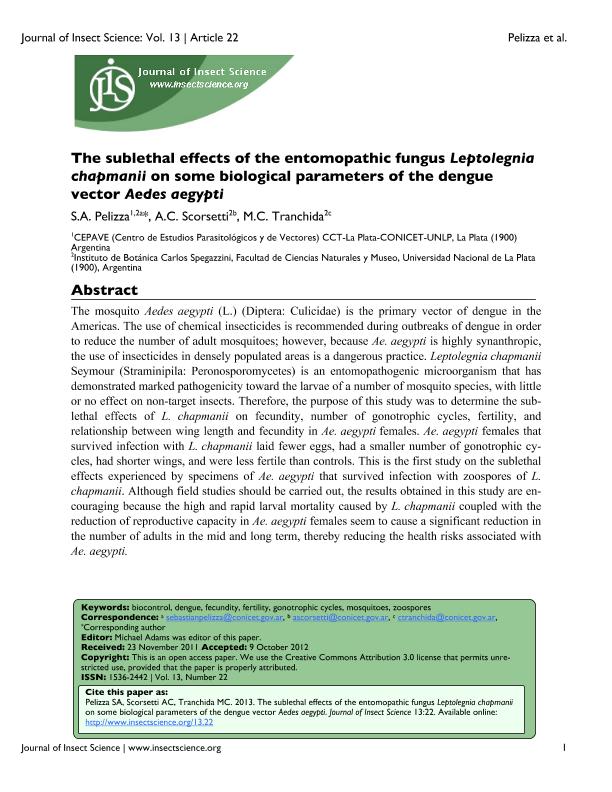Artículo
Sublethal effects of Leptolegnia chapmanii (Straminipila: Peronosporomycetes) on some biological parameters of the dengue vector, Aedes aegypti
Fecha de publicación:
03/2013
Editorial:
University Of Arizona
Revista:
Journal Of Insect Science
ISSN:
1536-2442
Idioma:
Inglés
Tipo de recurso:
Artículo publicado
Clasificación temática:
Resumen
The mosquito Aedes aegypti (L.) (Diptera: Culicidae) is the primary vector of dengue in the Americas. The use of chemical insecticides is recommended during outbreaks of dengue in order to reduce the number of adult mosquitoes; however, because Ae. aegypti is highly synanthropic, the use of insecticides in densely populated areas is a dangerous practice. Leptolegnia chapmanii Seymour (Straminipila: Peronosporomycetes) is an entomopathogenic microorganism that has demonstrated marked pathogenicity toward the larvae of a number of mosquito species, with little or no effect on non-target insects. Therefore, the purpose of this study was to determine the sublethal effects of L. chapmanii on fecundity, number of gonotrophic cycles, fertility, and relationship between wing length and fecundity in Ae. aegypti females. Ae. aegypti females that survived infection with L. chapmanii laid fewer eggs, had a smaller number of gonotrophic cycles, had shorter wings, and were less fertile than controls. This is the first study on the sublethal effects experienced by specimens of Ae. aegypti that survived infection with zoospores of L. chapmanii. Although field studies should be carried out, the results obtained in this study are encouraging because the high and rapid larval mortality caused by L. chapmanii coupled with the reduction of reproductive capacity in Ae. aegypti females seem to cause a significant reduction in the number of adults in the mid and long term, thereby reducing the health risks associated with Ae. aegypti.
Palabras clave:
Biocontrol
,
Dengue
,
Mosquitoes
,
Zoospores
Archivos asociados
Licencia
Identificadores
Colecciones
Articulos(CCT - LA PLATA)
Articulos de CTRO.CIENTIFICO TECNOL.CONICET - LA PLATA
Articulos de CTRO.CIENTIFICO TECNOL.CONICET - LA PLATA
Articulos(CEPAVE)
Articulos de CENTRO DE EST.PARASITOL.Y DE VECTORES (I)
Articulos de CENTRO DE EST.PARASITOL.Y DE VECTORES (I)
Citación
Pelizza, Sebastian Alberto; Scorsetti, Ana Clara; Tranchida, Maria Cecilia; Sublethal effects of Leptolegnia chapmanii (Straminipila: Peronosporomycetes) on some biological parameters of the dengue vector, Aedes aegypti; University Of Arizona; Journal Of Insect Science; 13; 22; 3-2013; 1-8
Compartir
Altmétricas




